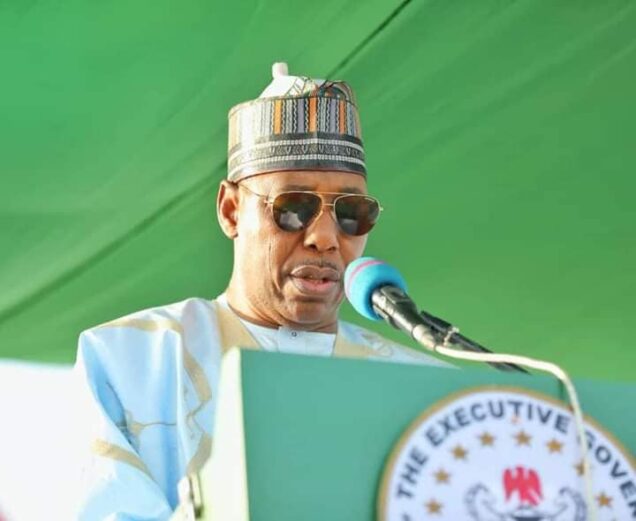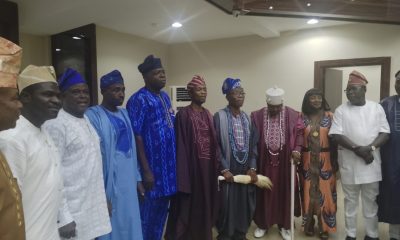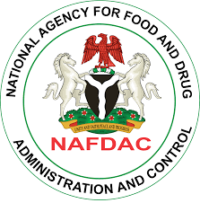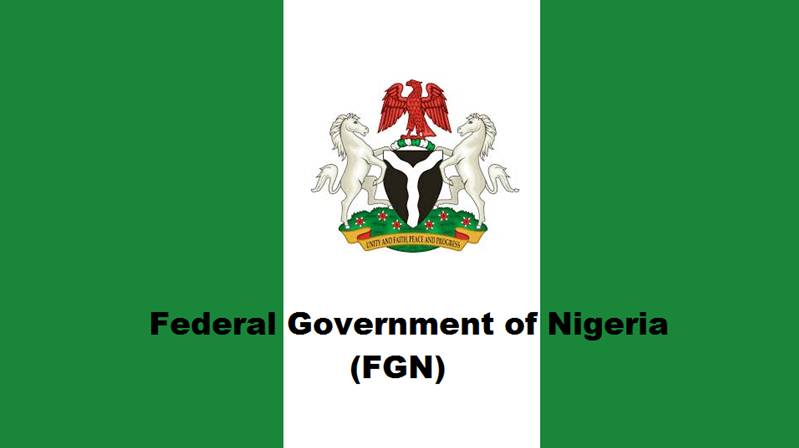Headlines
Nigeria: FG Admits Gaps in Provision of Health, Social Needs for Older Persons
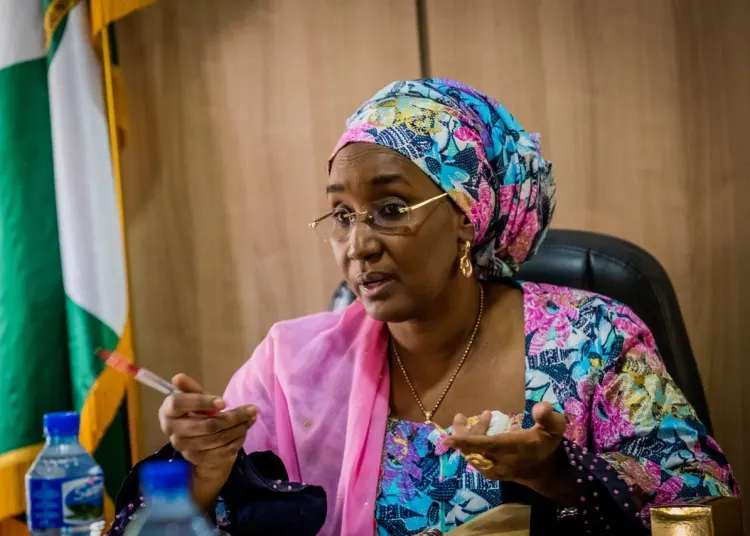
By Derrick Bangura
Nigeria’s Federal Government has admitted that despite the numbers of Nigerians with age 60 years and above standing at 14.8 million, there is increasing gaps in the provision of health and social needs of older persons, both at the national and subnational levels.
Speaking at the opening of a two-day national stakeholders workshop on integrated care of older persons with theme: “Realigning and Strengthening Institutional Capacity for Delivery of Integrated Care for Older Persons,” the Minister for Humanitarian Affairs, Disaster Management and Social Development, Hadiza Sadiya Umar-Farouq noted that: “There are currently over 14.8 million Nigerians, who are 60 years and above according to data from the National Bureau of Statistics (NLSS 2018-2019 NBS), with the rapidly increasing proportion and absolute numbers of older persons in Nigeria, despite the country’s youthful population, there are increasing gaps in the provision. Of health and social needs of older persons, both at the national and subnational levels.
The Minister said the signing of the National Senior Citizens bill into law , the approval of the National Policy on Ageing and the inauguration of the board of the National Senior Citizens Centre by the president laid the legal and institutional frameworks to improve the effective delivery of health and social care for older people.
Umar-Farouq who was represented by the Special Adviser to the President on Humanitarian Affairs, Alhaji Musa Bungudu said with the objective of the two-day national workshop to assess the status of inclusion of older persons in primary care services and to consider and strategize ways of realigning and strengthening institutional capacities to deliver integrated care for older persons, she said she was optimistic that the outcome document from what promises to be very stimulating technical deliberations, will usher a new dawn in accessible, appropriate primary health care for older persons.
The National Senior Citizens Centre, speaking on the workshop which it organised with the National Primary Health Care Development Agency (NPHCDA), and the World Health Organisation (WHO), lamented the poor understanding of ageing issues among relevant Ministries, Department and Agencies of government.
The Director General of the Centre, Dr. Emem Omokaro also lamented that older persons themselves, their family members and their communities lack adequate knowledge of ageing issues.
She said this has further compounded the challenges facing senior citizens in the country.
Omokaro, which identified some of these challenges to include, poverty, poor health, lack of access to food, shelter, water and sanitation among others, stated that 70 percent of the total population of older persons in the country who are in rural communities are mostly affected by these challenges.
She said the poor understanding has affected the inclusiveness of older persons in development and social services plans.
She said, “There are 14.8 million older persons living in Nigeria. 70 percent of them residing in rural areas. They have particular challenges , COVID-19 exposed these vulnerabilities and the fragility of existing systems older people are disproportionately impacted by the burden of poverty, poor health, disability, social isolation and exclusion , violence, lack of access to basic resources like food, shelter , water and sanitation among others. Such burdens are compounded when they follow a life course of poverty.
“The bedrock of these challenges is the poor understanding of ageing issues across the relevant sectors (MDAs) that have mandates concerning older persons as well as amongst the older persons themselves, their family members and their communities. This gap hinders age-centered service delivery and inclusiveness of older persons in development and social services plans.”
The objectives of the workshop are: to strengthen synergies for delivering care for the older persons; to secure commitment and support from Executive Secretaries/Chairmen/Permanent Secretary of State Primary Health Boards/Agencies for the establishment of Units for the care of older persons; to strategize on strengthening institutional capacity for care of Older Persons within the PHC system by leveraging on existing interventions (WDC, CHIPS, Volunteers, NEMCHIC/SEMCHICs, among others.
Headlines
Noble Ladies Champion Women’s Financial Independence at Grand Inauguration in Abuja

Women from diverse backgrounds across Nigeria and beyond gathered at the Art and Culture Auditorium, Abuja, for the inauguration and convention of the Noble Ladies Association. The event, led by the association’s Founder and “visionary and polished Queen Mother,” Mrs. Margaret Chigozie Mkpuma, was a colourful display of feminine elegance, empowerment, and ambition.
The highly anticipated gathering, attended by over 700 members and counting, reflected the association’s mission to help women realise their potential while shifting mindsets away from dependency and over-glamorization of the ‘white collar job.’ According to the group, progress can be better achieved through innovation and creativity. “When a woman is able to earn and blossom on her own she has no reason to look at herself as a second fiddle,” the association stated.
One of the association’s standout initiatives is its women-only investment platform, which currently offers a minimum entry of ₦100,000 with a return of ₦130,000 over 30 days—an interest rate of 30 percent. Some members invest as much as ₦1 million, enjoying the same return rate. Mrs. Mkpuma explained that the scheme focuses on women because “women bear the greater brunt of poverty” and the platform seeks “to offer equity in the absence of economic equality.”
Education is also central to the Noble Ladies’ mission, regardless of age. Their mantra, “start again from where you stopped,” encourages women to return to school or upgrade their skills at any stage in life. The association believes that financial stability is vital in protecting women from cultural practices that dispossess widows of their late husbands’ assets, while also enabling them to raise morally and socially grounded families.
Founded on the vision of enhancing women’s skills and achieving financial stability, the association rests on a value system that discourages pity and promotes purpose. “You have a purpose and you build on that purpose to achieve great potentials and emancipation,” Mrs. Mkpuma said.
A criminologist by training and entrepreneur by practice, she cautions against idleness while waiting for formal employment. “There are billions in the informal and non-formal sectors waiting to be made,” she said, rejecting the “new normal of begging” and urging people to “be more introspective to find their purpose in life and hold on to it.”
Mrs. Mkpuma’s management style keeps members actively engaged, focusing on vocational skills and training to prepare them for competitive markets. She is exploring “innovative integration of uncommon technologies” and is already in talks with international franchises to invest in Nigeria, with Noble Ladies as first beneficiaries.
The association’s core values include mutual respect, innovation, forward-thinking, equal opportunity, and financial emancipation. With plans underway to establish a secretariat in the heart of Abuja, the group aims to expand its impact.
The event drew high-profile guests, including former Inspector General of Police, Mike Okiro, and a host of VIPs, marking a significant milestone in the association’s drive for women’s empowerment.
Headlines
NEPZA, FCT agree to create world-class FTZ environment

The Nigeria Export Processing Zones Authority (NEPZA) has stepped in to resolve the dispute between the Federal Capital Territory Administration and the Abuja Technology Village (ATV), a licensed Free Trade Zone, over the potential revocation of the zone’s land title.
Dr. Olufemi Ogunyemi, the Managing Director of NEPZA, urged ATV operators and investors to withdraw the lawsuit filed against the FCT administration immediately to facilitate a roundtable negotiation.
Dr. Ogunyemi delivered the charge during a courtesy visit to the Minister of the Federal Capital Territory, Barrister Nyesom Wike, on Thursday in Abuja.
You will recall that the ATV operators responded to the revocation notice issued by the FCT administration with a lawsuit.
Dr. Ogunyemi stated that the continued support for the growth of the Free Trade Zones Scheme would benefit the nation’s economy and the FCT’s development, emphasizing that the FCT administration recognized the scheme’s potential to accelerate industrialisation.
Dr. Ogunyemi, also the Chief Executive Officer of NEPZA, expressed his delight at the steps taken by the FCT minister to expand the economic frontier of the FCT through the proposed Abuja City Walk (ACW) project.
Dr. Ogunyemi further explained that the Authority was preparing to assess all the 63 licensed Free Trade Zones across the country with the view to vetting their functionality and contributions to the nation’s Foreign Direct Investment and export drives.
“I have come to discuss with His Excellency, the Minister of the Federal Capital Territory on the importance of supporting the ATV to succeed while also promoting the development of the Abuja City Walk project. We must work together to achieve this for the good of our nation,” he said.
On his part, the FCT Minister reiterated his unflinching determination to work towards President Bola Ahmed Tinubu’s Renewed Hope Agenda by bringing FDI to the FCT.
“We must fulfil Mr. President’s promises regarding industrialization, trade, and investment. In this context, the FCT will collaborate with NEPZA to review the future of ATV, a zone that was sponsored and supported by the FCT administration,” Wike said.
Barrister Wike also said that efforts were underway to fast-track the industrialisation process of the territory with the construction of the Abuja City Walk.
The minister further said the Abuja City Walk project was planned to cover over 200 hectares in the Abuja Technology Village corridor along Airport Road.
According to him, the business ecosystem aimed to create a lively, mixed-use urban center with residential, commercial, retail, hospitality, medical, and institutional facilities.
He added that the ACW would turn out to be a high-definition and world-class project that would give this administration’s Renewed Hope Agenda true meaning in the North-Central Region of the country.
Barrister Wike also indicated his continued pursuit of land and property owners who failed to fulfil their obligations to the FCT in his determination to develop the territory.
Headlines
Benue IDPs block highway, demand return to ancestral homes

Vehicular movement along the Yelwata axis of the Benue–Nasarawa highway was brought to a standstill on Wednesday as Internally Displaced Persons, IDPs, staged a protest, demanding immediate return to their ancestral homes.
The protesters, believed to be victims of persistent attacks by suspected herdsmen, blocked both lanes of the busy highway for several hours, chanting “We want to go back home”.
The protest caused disruption, leaving hundreds of motorists and passengers stranded.
Eyewitnesses said the displaced persons, many of whom have spent years in overcrowded IDP camps, are expressing deep frustration over the government’s delay in restoring security to their communities.
“We have suffered enough. We want to return to our homes and farms,” one of the protesters told reporters at the scene.
Security personnel were reportedly deployed to monitor the situation and prevent any escalation, though tensions remained high as of press time.
Efforts to reach the Benue State Emergency Management Agency, SEMA, and other relevant authorities for comment were unsuccessful.
-

 Headlines4 years ago
Headlines4 years agoFacebook, Instagram Temporarily Allow Posts on Ukraine War Calling for Violence Against Invading Russians or Putin’s Death
-

 Headlines4 years ago
Headlines4 years agoNigeria, Other West African Countries Facing Worst Food Crisis in 10 Years, Aid Groups Say
-

 Foreign4 years ago
Foreign4 years agoNew York Consulate installs machines for 10-year passport
-

 News1 year ago
News1 year agoZero Trust Architecture in a Remote World: Securing the New Normal
-

 Entertainment3 years ago
Entertainment3 years agoPhyna emerges winner of Big Brother Naija Season 7
-

 Headlines1 year ago
Headlines1 year agoNigeria Customs modernisation project to check extortion of traders
-

 Entertainment2 years ago
Entertainment2 years agoMovie download platform, Netnaija, announces closure
-

 Economy2 years ago
Economy2 years agoWe generated N30.2 bn revenue in three months – Kano NCS Comptroller





